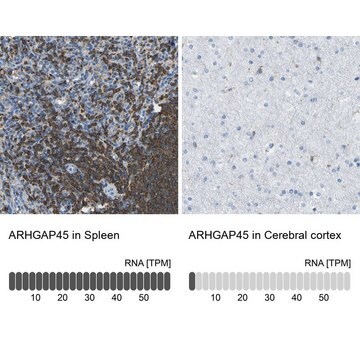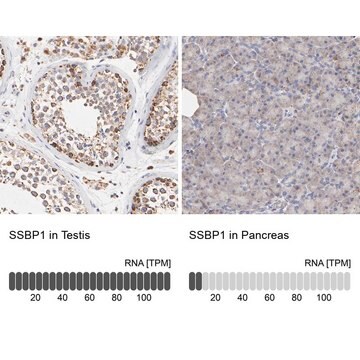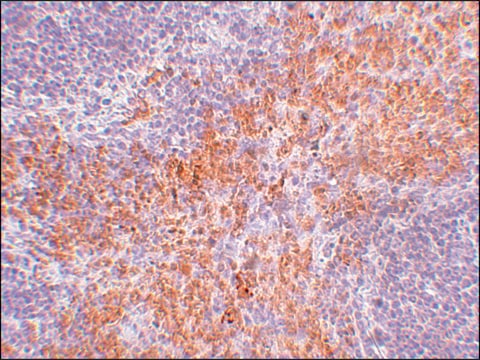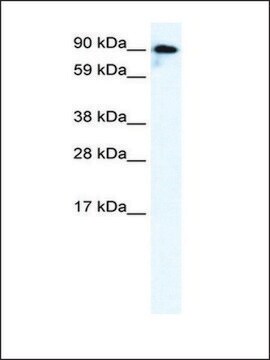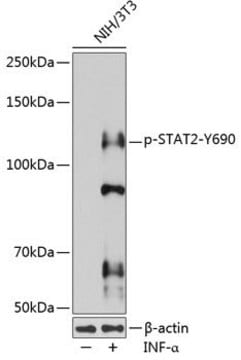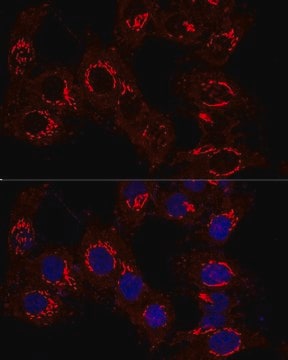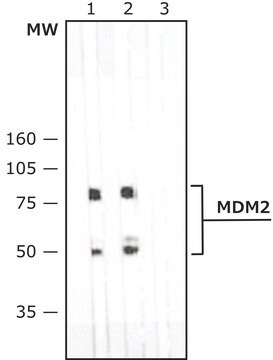Wichtige Dokumente
SAB4200341
Anti-Golph3 (N-terminal) antibody produced in rabbit
~1.0 mg/mL, affinity isolated antibody
Synonym(e):
Anti-GOPP1, Anti-GPP34, Anti-Golgi peripheral membrane protein 1, 34 kDa, Anti-Golgi phosphoprotein 3 (coat-protein), Anti-Golgi-associated protein; Mitochondrial DNA absence factor, Anti-MIDAS
About This Item
Empfohlene Produkte
Biologische Quelle
rabbit
Qualitätsniveau
Konjugat
unconjugated
Antikörperform
affinity isolated antibody
Antikörper-Produkttyp
primary antibodies
Klon
polyclonal
Form
buffered aqueous solution
Mol-Gew.
antigen ~34 kDa
Speziesreaktivität
mouse, human
Konzentration
~1.0 mg/mL
Methode(n)
immunoprecipitation (IP): 5-10 μg using lysates of human HeLa cells
indirect immunofluorescence: 2.5-5.0 μg/mL using mouse 3T3 cells
western blot: 1-2 μg/mL using whole extracts of human HeLa cells
UniProt-Hinterlegungsnummer
Versandbedingung
dry ice
Lagertemp.
−20°C
Posttranslationale Modifikation Target
unmodified
Angaben zum Gen
human ... GOLPH3(64083)
mouse ... Golph3(66629)
rat ... Golph3(78961)
Allgemeine Beschreibung
Immunogen
Anwendung
- immunoprecipitation
- immunofluorescence
- immunoblotting
Biochem./physiol. Wirkung
Physikalische Form
Haftungsausschluss
Sie haben nicht das passende Produkt gefunden?
Probieren Sie unser Produkt-Auswahlhilfe. aus.
Lagerklassenschlüssel
10 - Combustible liquids
Flammpunkt (°F)
Not applicable
Flammpunkt (°C)
Not applicable
Analysenzertifikate (COA)
Suchen Sie nach Analysenzertifikate (COA), indem Sie die Lot-/Chargennummer des Produkts eingeben. Lot- und Chargennummern sind auf dem Produktetikett hinter den Wörtern ‘Lot’ oder ‘Batch’ (Lot oder Charge) zu finden.
Besitzen Sie dieses Produkt bereits?
In der Dokumentenbibliothek finden Sie die Dokumentation zu den Produkten, die Sie kürzlich erworben haben.
Unser Team von Wissenschaftlern verfügt über Erfahrung in allen Forschungsbereichen einschließlich Life Science, Materialwissenschaften, chemischer Synthese, Chromatographie, Analytik und vielen mehr..
Setzen Sie sich mit dem technischen Dienst in Verbindung.